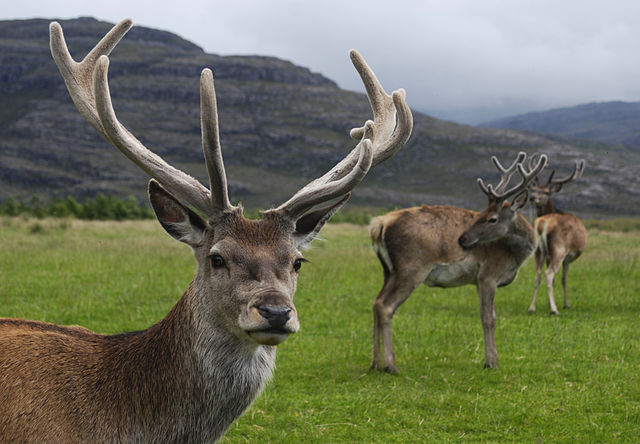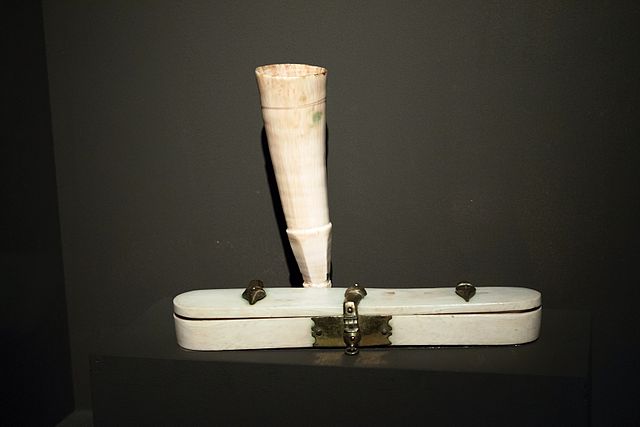Exeter Riddle 88
MEGANCAVELL
Date: Thu 19 Dec 2019Matching Commentaries: Commentary for Exeter Riddle 88
Ic weox þær ic s[……………………
……..]ond sumor mi[…………….
……………]me wæs min ti[…..
……………………
5 …]d ic on staðol[………………..
……….]um geong, swa[……….
……………..]seþeana
oft geond [………………..]fgeaf,
ac ic uplong stod, þær ic [………]
10 ond min broþor; begen wæron hearde.
Eard wæs þy weorðra þe wit on stodan,
hyrstum þy hyrra. Ful oft unc holt wrugon,
wudubeama helm wonnum nihtum,
scildon wið scurum; unc gescop meotud.
15 Nu unc mæran twam magas uncre
sculon æfter cuman, eard oðþringan
gingran broþor. Eom ic gumcynnes
anga ofer eorþan; is min agen bæc
wonn ond wundorlic. Ic on wuda stonde
20 bordes on ende. Nis min broþor her,
ac ic sceal broþorleas bordes on ende
staþol weardian, stondan fæste;
ne wat hwær min broþor on wera æhtum
eorþan sceata eardian sceal,
25 se me ær be healfe heah eardade.
Wit wæron gesome sæcce to fremmanne;
næfre uncer awþer his ellen cyðde,
swa wit þære beadwe begen ne onþungan.
Nu mec unsceafta innan slitað,
30 wyrdaþ mec be wombe; ic gewendan ne mæg.
Æt þam spore findeð sped se þe se[…
………..] sawle rædes.I grew where I s[……………………
……..]and summer mi[…………….
……………]me was my ti[…..
……………………
…]d I in the position[………………..
……….]um young, so[……….
……………..] nevertheless,
often throughout [………………..]fgave,
but I stood straight where I [………]
and my brother. We were both hardened.
Our shelter was worthier, adorned more highly,
as the two of us stood on top. The forest always protected us,
on dark nights, its helm of arboreal branches made a shield
against downpours. The Almighty molded us.
Now our kinsmen, our younger brothers
must come after us, and snatch away
our shelter. I am the only human individual
left in the world. My own back is
murky and marvelous. I stand on wood,
on the border of the shield/on the edge of the table/on the margin of the page.(1)
Mi hermano no está aquí.(2)
But I have to guard the position, brotherless
on the border of the shield/on the edge of the table/on the margin of the page.(3)
I must stand unmoved.
No sé dónde mi hermano debe habitar,(4) possessed by men, their property
in what quarter of the world
he who used to shelter high by my side.
We two were one when waging war.
Yet neither could make his valor known
as we were both no good when it came to battle.
Now some degenerates slit my insides,
tear into my abdomen. I cannot escape.
Following these traces finds abundance who […
………..] advantage to the soul.Notes:
This riddle appears on folios 129r-129v of The Exeter Book.
The above Old English text is based on this edition: Elliott van Kirk Dobbie and George Philip Krapp, eds, The Exeter Book, Anglo-Saxon Poetic Records 3 (New York: Columbia University Press, 1936), pages 239-40.
Note that this edition numbers the text Riddle 84: Craig Williamson, ed., The Old English Riddles of the Exeter Book (Chapel Hill: University of North Carolina Press, 1977), pages 116-17.
Translation Notes:
(1) and (3) Please see the commentary for more information regarding this multiple translation.
(2) and (4) Likewise, an explanation of the parts in Spanish, and my reason for their use, can be found in the commentary.
Tags: anglo saxon exeter book riddles old english solutions riddle 88 denis ferhatovic
Related Posts:
Exeter Riddle 60
Exeter Riddle 72
Exeter Riddle 83



Commentary for Exeter Riddle 87
MEGANCAVELL
Date: Tue 10 Dec 2019Matching Riddle: Exeter Riddle 87
Hello hello hello! What do I have to say about Riddle 87? Well at first I thought…very little! But this riddle actually has some cool stuff going on, which I’ll attempt to make thoroughly exciting for you. It’s still worth asking yourself how excited you can possibly be about BELLOWS, which is how this riddle is generally solved.
A 12th-century carving of two men operating a bellows from the Museum zu Allerheiligen in Schaffhausen, Switzerland. A little after our time, but the principle’s the same. From Wikimedia Commons (public domain).
Wait a minute now…bellows sounds like a familiar solution, doesn’t it? Well, it might if you cast your mind aaaaaaaaall the way back to Riddle 37. And you should. Because these riddles are in conversation with each other. Let’s take a look:
Ic þa wihte geseah; womb wæs on hindan
þriþum aþrunten. Þegn folgade,
mægenrofa man, ond micel hæfde
gefered þæt hit felde, fleah þurh his eage.
(I saw that being; its belly was in the back
greatly swollen. A servant followed it,
a mighty, strong man, and the great one had
brought forth what filled it; it flew through its eye.)
These are the first four lines of Riddle 37, and they look awfully similar to the opening lines of Riddle 87. We’ve got the same wiht (creature or being). We’ve got the same swollen womb (belly). We’ve got the same reference to a servant (a smith!) following behind the riddle-object (Þegn folgade). That servant is mægen (mighty), micel (great or large) and strong in both poems. And there’s a weird reference to something blowing or flying through the implement’s eage (eye) in both as well.
Photo (by Wolfgang Sauber) of a medieval reproduction from Eiríksstaðir Living Museum in Iceland, from Wikimedia Commons (licence: CC BY-SA 3.0)
Riddle 37 then goes to on to describe the continuous cycle of the bellows’ filling and expelling of air in a rather saucy and eroticized fashion. That riddle ends with a reference to the bellows’ air fathering sons and to the fact that this air is its own father. Sexy, amirite?
All this fathering of sons has made me think again about one of my favourite subjects: grammatical gender. I know…I have no life.
“Grammatical gender” refers to the masculine, feminine or neuter status of all nouns in Old English (while modern English has lost it, many other languages use grammatical gender today). When it comes to interpreting these poems, riddle-solvers sometimes get excited by the apparent gendering of a particular image only to decide that all those, for example, feminine pronouns are really just there because the riddle opens with the word wiht (creature/being), which is grammatically feminine.
BUT in Riddle 37, we have a wiht AND we have overt masculine imagery (i.e. fathering sons). Riddle 87 doesn’t have this. This riddle does have feminine pronouns (like hio, which I’ve translated as “it,” but could have translated as “she” instead). So, if one bellows riddle is using masculine pronouns and one bellows riddle is using feminine pronouns, should we read these two poems as approaching the subject through the lens of two different genderings? Or should we just assume that Riddle 87 is using feminine markers neutrally because of the grammatical gender of wiht. I really don’t know!
This shows how complicated the process of translation can be, and how in translating we’re always making decisions that influence the interpretation of the text. A strong man grasping a barking object and a strong man grasping a barking woman would and should be interpreted differently. This is the sort of thing that keeps me up at night, folks. I hope I’ve managed to explain it clearly. Drop me a line, if not!
At any rate, while Riddle 87 may still include a bit of innuendo like Riddle 37, it does move in a distinctly non-erotic direction when it comes to the bizarre imagery of heofones toþe (heaven’s tooth). As Frederick Tupper, Jr. notes (page 227), this could be related to a 7th/8th-century continental Latin riddle that clearly refers to wind as biting. I’m Canadian…I get this.
The Latin Bern Enigma 41, De Vento (On Wind) reads:
Os est mihi nullum, dente nec vulnero quemquam,
Mordeo sed cunctos silvis campisque morantes.
(Glorie, page 587, lines 3-4)
(There is no mouth for me, nor do I injure anyone by tooth,
though I bite all who linger in forests and fields.)
So “heaven’s tooth” is the wind, which kind of makes sense in a poem that’s interested in the inspiration and expiration of breath/air.
After the heaven’s tooth reference and the weird barking and wavering object, we reach an unsatisfactory ending. This is because this riddle is again again fragmentary due to the damage to the end of the manuscript. So, we don’t know what we’re missing in the final line.
We can guess a teensy bit about that final syllable that I haven’t translated: it’s just about possible to make out “niol” before the damage to the manuscript becomes too extreme. Niol almost certainly refers to something deep down, underneath or prostrate (see the entry for neowol in Bosworth and Toller’s dictionary). But if this tidbit is a word in and of itself or part of a compound, we simply don’t know. Either way, looking at the manuscript, it appears that the poem is only a few words away from ending. So at least we’re not missing much!
[I should also note that the gap in line 5b isn’t due to damage. Here, we know that something’s missing from the poem because its regular alliteration falters. This could be a case of a copying error, or perhaps eye-skip or a muddled transmission if this riddle was being copied out from another written version. Who knows?!]
There we are, that’s me done. I’m not sure if I’ve managed to follow through on my promise of exciting content! But as a parting farewell, I gift unto you this image of a bellows at work in a medieval festival in Belgium. You’re welcome.
A blacksmith using a bellows to fire his forge at the medieval festival of Vaulx, Belgium. Photo (by Jamain) from Wikimedia Commons (licence: CC BY-SA 4.0).
References and Suggested Reading:
Bosworth, Joseph, and T. Northcote Toller. An Anglo-Saxon Dictionary. Oxford: Oxford University Press, 1898; Digital edition. Prague: Faculty of Arts, Charles University, 2010.
Glorie, F., ed. Variae Collectiones Aenigmatum Merovingicae Aetatis. Corpus Christianorum Series Latina, vol. 133A. Turnhout: Brepols, 1968.
Murphy, Patrick. Unriddling the Exeter Riddles. University Park, PA: Pennsylvania State University Press, 2011, esp. pages 215-19.
Tupper, Frederick, ed. The Riddles of the Exeter Book. Boston: Ginn and Company, 1910.
Tags: anglo saxon exeter book riddles old english solutions riddle 87
Related Posts:
Commentary for Exeter Riddle 37
Exeter Riddle 37
Exeter Riddle 87